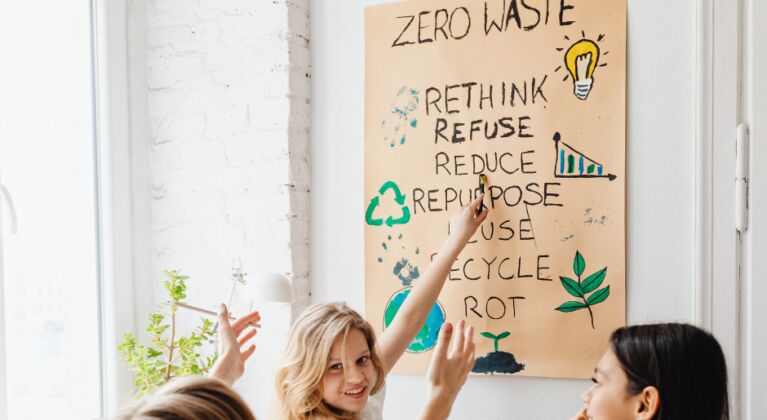

J&B Recycling Knowledge

Eco Tips for the School Year
As pupils across the country head back to school, it’s a great time to rethink habits that affect both the household budget and the environment. Each pupil generates an estimated 20–45kg of waste every academic year. With millions of children in schools across the UK, that adds up to at least 180 million kg of waste annually. By making small, sustainable changes, families and schools can reduce this significantly.
Donating and reusing school uniforms
Uniform is often the biggest expense at the start of term — and one of the biggest environmental burdens. With personalised logos and embroidered designs, many items can’t be recycled. However, trousers, skirts, shirts and even blazers can often be reused. Many schools now run take-back or swap schemes so that good-quality uniforms can be passed on to other pupils. If your child’s school doesn’t run one, consider starting a parent-led uniform exchange.
Every year, around 1.4 million school uniforms are thrown away — many of which could be reused. Because they often contain polyester, that equates to roughly 350 tonnes of plastic. Choosing second-hand, donating outgrown clothes, or buying from sustainable suppliers can make a big difference.
Stationery and supplies
It’s tempting to buy a whole set of new stationery at the start of term, but much of last year’s can still be used. Check pencil cases, drawers and cupboards before shopping. Refillable pens, mechanical pencils and recycled notebooks are longer-lasting and reduce waste. Avoid novelty stationery that can’t be recycled and often breaks quickly.
Encourage children to take care of their supplies so they last the full school year. A little bit of organisation goes a long way to cutting unnecessary waste.
Zero-waste lunchboxes
Packed lunches can be a hotspot for unnecessary waste. A few simple swaps can help:
· Choose a durable lunchbox and reusable drinks bottle.
· Pack food in reusable tubs instead of clingfilm or foil.
· Buy larger packs of snacks and portion them out, rather than single-serve items.
· Opt for fresh fruit and vegetables where possible — they’re healthier, cost-effective and usually come with less packaging.
Not only does this reduce packaging waste, it also saves money and helps teach children good habits early on.
Tackling food waste
School canteens and packed lunches can generate a lot of food waste. Parents can help by only packing what children will realistically eat and using leftovers creatively for the next day. Schools can support by reviewing portion sizes in canteens, setting up composting schemes, or partnering with local charities that redistribute surplus food.
Teaching children about food waste at a young age builds awareness that lasts a lifetime.
Rethinking the school run
Travel to school is another area where environmental choices add up. A generation ago, most children walked, yet fewer than half do now — despite many living within two miles of their nearest primary school. One in four cars on the morning commute carries children, creating around half a million tonnes of CO₂ annually.
Walking, cycling or scooting is best where possible. If not, look at accessible bus routes, consider a car share with friends, or ask about school bus passes. Fewer vehicles outside school gates means less congestion, lower emissions, and safer air for children — particularly important given that in 71% of UK towns and cities, children breathe unsafe levels of air pollution.
Managing technology and e-waste
From calculators and laptops to tablets and chargers, schools and pupils use a lot of technology. When devices are no longer needed, don’t let them end up in general waste. Many can be donated, refurbished, or recycled responsibly.
At J&B Recycling, we provide dedicated WEEE (Waste Electrical and Electronic Equipment) recycling services for schools and businesses, ensuring valuable materials are recovered safely. This keeps harmful items out of landfill and supports a circular economy.
Recycling at school
Clear, well-labelled bins make a big difference. Schools should aim to separate paper, plastics, cans and food waste wherever possible. Encouraging pupils to recycle correctly helps instil good habits and prevents contamination.
J&B Recycling can support schools by providing recycling collections and guidance on how to manage waste streams effectively. This ensures materials are kept in the right place and maximised for recycling.
Get involved in eco initiatives
Many schools now run eco clubs, energy-saving projects or recycling competitions. Parents can support these by volunteering, donating resources or simply encouraging children to get involved. Wildlife gardens, litter picks and even small energy-saving pledges can all have a big impact.
At J&B Recycling, we are proud to work with schools across the North of England. We regularly deliver assemblies on recycling and the environment, support eco clubs, and even join in with community litter picks. Schools are also welcome to visit our Materials Recovery Facility (MRF) in Hartlepool, where pupils of all ages — from primary schools to universities — can see first-hand how recycling works. We also provide free resources on our website to help teachers bring sustainability into the classroom.
Small steps, big impact
When families and schools work together, even small changes can lead to big reductions in waste. Whether it’s reusing uniforms, packing a smarter lunchbox, reducing food waste, changing the school run, recycling properly or getting behind eco projects, these actions add up to lasting benefits for both the environment and the community.
To find out how J&B Recycling can support your school with recycling services, resources or tours of our Hartlepool MRF, visit our Education Resources page.

Delivery & collection
services covering
the UK
Where we operate
Request a quote
For an instant quote, call our team on
01429 272810- 1. Waste type
- 2. Company Details
- 3. Enquiry Details
- 4. Thank you